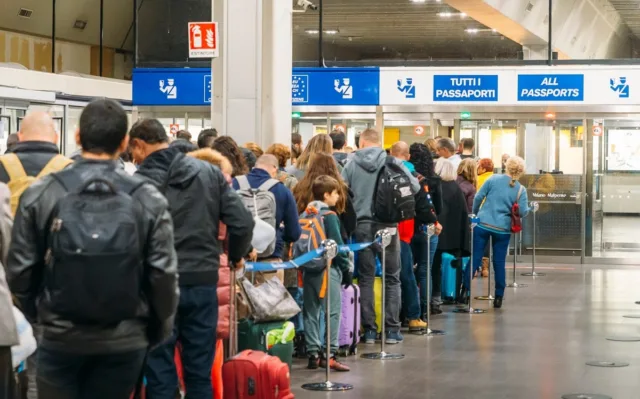As we approach 2024, a set of new travel rules is set to reshape the way we fly, from changes in hand luggage regulations to entry requirements for Brits heading to Europe. Despite the challenges posed by the pandemic, the travel industry is poised for a resurgence, with flight numbers expected to reach new heights.
Hand Luggage Revolution: Upgraded Security Scanners and Liquid Allowance
Passengers in the UK will soon experience a significant shift in hand luggage rules. The UK government has announced the nationwide upgrade of airport security scanners by June 2024, allowing travellers to carry up to two liters of liquid onboard planes. London City Airport has already implemented these advanced scanners, streamlined security operations and eliminated the need for passengers to purchase expensive miniature toiletries.
However, it’s important to note that until other airports confirm the completion of scanner installations, the existing 100-ml liquids rule remains in effect for outbound flights. Passengers should check the rules at their destination for the return journey, as regulations may vary.
Since July of the previous year, e-Gates are now accessible to children as young as 10 at 13 UK airports, facilitating quicker airport processes for families.
Passport Rules: Post-Brexit Requirements
Under post-Brexit regulations, UK passports must be less than 10 years old on the day of travel and have at least three months remaining after the return date. Despite these requirements being in place for some time, occasional misinterpretations by airport staff highlight the importance of passengers ensuring their documents align with the specified criteria.
In addition to document dates, travellers should be vigilant about passport damage, as any significant harm could render the passport invalid.
New EU Entry/Exit System (EES) and Visa Changes
By autumn 2024, the Entry/Exit System (EES) will be implemented for non-EU citizens entering EU countries. This digital process will include registering personal information, fingerprints, facial images, and entry and exit details. While designed to expedite processes, Brits are warned of potential delays and queues.
The international visa landscape is also evolving, with several countries easing visa requirements. The ongoing digitalization of visas, particularly in the Schengen Area, is expected to culminate in the introduction of the EU Travel Information & Authorization System (ETIAS) in early 2025. This system will charge most non-EU citizens €7 for travel to the bloc.
Tourist Taxes: Navigating New Levies
Numerous destinations globally are grappling with managing tourist numbers and turning to additional taxes to generate revenue and control visitor influxes. In 2024, Venice will introduce a €5 entrance fee for day visitors, aiming to address the challenges posed by the annual arrival of 30 million tourists.
Other destinations are increasing existing tourist taxes, with Paris implementing a charge nearly 200% higher than the current rate, Amsterdam raising the tax to 12.5% of hotel room rates, and Valencia planning a variable fee between €0.50 and €2 per night.
Travelers are advised to research destination-specific levies before booking, as these charges can significantly impact holiday costs, especially for families or groups.
Paris Olympics: Impact on Prices and Transportation
In 2024, Paris will host the Summer Olympics, and this event will affect travel experiences in the city. Single metro journeys will cost €4, almost double the normal price, and a Paris 2024 transport pass will be introduced. Residents of the city, however, will not be subject to these price hikes. According to a study commissioned by Airbnb and conducted by Deloitte, prices in the Île-de-France (Paris) region are expected to rise by 85% during the Games, providing insight into the economic implications for travellers during this period.









